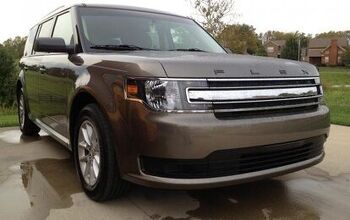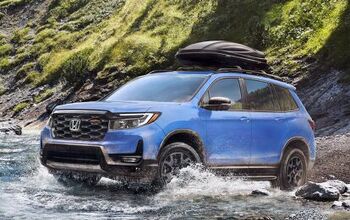Bark's Bites: A Moment of Appreciation for Depreciation

Everybody on the internet knows that buying new cars is just plain stupid. New cars, after all, are just “depreciating hunks of metal.” New cars depreciate an average of 20% immediately, and then go down another 15% each year after that, according to sources such as KBB and Edmunds. According to every message board I’ve ever read, buying a new car will probably cause you to lose your house, get divorced, and be sent to the Chateau d’If for thirteen years.
But how true is that? And if it is true, does it matter? Let’s find out.
2000 Hyundai Tiburon (bought new in March 2000)
2001 Hyundai Santa Fe (bought new in June 2001)
2004 Mazda RX-8 (bought new in May 2005)
2009 Pontiac G8 GT (bought new in October of 2008)
2013 Ford Boss 302 (bought new in June 2012)
Each car was financed over a sixty month term, and only the Tiburon had any sort of cash down payment (you can read about how that happened in my epic tale of short-lived 944 ownership). Each car was traded in on its successor at a franchise dealership. In other words, I did exactly what you’re NOT supposed to do. How did it work out?
The longest I kept any car was nearly four years. The shortest was a little over a year. In each case, I either got out even up (Tiburon, Santa Fe) or I had positive equity on my trade(RX-8, G8). So, essentially, I leased the cars for varying terms from sixteen to forty-six months. How did I manage to do this without taking massive financial losses?
1) Negotiate the hell out of the price on the front end. With the exception of the Boss (which, at that point, was seeing an average of $5K-10K ADM), I paid significantly less than invoice for the car. My best purchase was on the RX-8. For a car that stickered at just over $30k, I paid $22,500, which included a $4K factory rebate and $4K of dealer markdown. I was able to accomplish this due to my patience and willing to buy a car from the previous model year six months into the current model year. It took over two weeks of negotiating to make this happen, including walking away from the deal entirely twice only to have the dealer call me back. Use everything that’s available to you. Maybe your employer is a GM supplier-find out. Get invoice numbers, not only on the base car but on options. Dealers HATE how much information is available to consumers now-more than one dealer has said it’s impossible to make money on the front end of a sale of a new car. Use it all. You’re not there to make friends. Which leads me to…
2) Finance, finance, finance-but only at a good rate. It’s amazing to me how many people will battle like crazy on the price of a car only to give it all back in the Finance and Insurance office. If you have a beacon score of at least 700 (and that’s auto-adjusted, meaning that even if you’ve missed a credit card payment or two over the years but you’ve paid your car on time, you should be fine), there is NO REASON to ever, ever pay more than whatever the best promotional rate available is. If you’re at least a 660, you can still negotiate down to a very good rate-nothing more than 3.9% over sixty months. Anything that’s less than the rate of inflation is essentially free money. I was able to get zero percent for 60 months on the G8, so the payments I was making three years into my schedule were actually worth about six or seven percent less in actual dollars than the payments I was making in my first year. If the dealership is trying to hit you with a rate over five percent, it’s because the F and I guy is getting spiffed on every point above and beyond standard rates he can get you to agree to. Back-end profits are about all a dealer has left nowadays-don’t give it away. Know your score before you go in and, even better, pre-arrange financing with your own financial institution so you have an offer in your pocket.
3) Try to buy interesting, desirable cars. Most modern dealers will have some sort of desirability index that they reference when deciding what value they give your trade. It grades the supply of similar vehicles in the market compared to the market demand for that vehicle. If you have a 2011 Ford Fusion, you are screwed. The supply of these vehicles far outweighs the demand. Get ready to battle. If you have a 2009 Jeep Wrangler with low miles, feel free to sit on your hands and wait for the offers to come in. I was able to leverage this in two cases-my RX-8 and my Tiburon (and if I’d been willing to wait a little bit longer, my G8, too). I got crushed on my Santa Fe. Nobody wanted a Hyundai with nearly 100,000 miles on it. Part of my two-week negotiation with the Mazda dealer on my RX-8 was getting them to just get me out of the Santa Fe even up; they initially offered a value that was four thousand dollars less than my remaining payoff. The cooler and more interesting your car is when you buy it, the cooler and more interesting it will be when you go to trade it in. But even if you have a lame car…
4) Dealers need to take in trades for their business model to work. Auction prices are out of control. Dealers both want and need trades-in fact, they are keeping stuff now that they never, ever would have before. It’s no longer crazy to go in asking for retail price for your car. You might not necessarily get it, but you might not be that far off, especially if the used car manager has a prospective customer for your car. I had a used car manager stalk me on my G8 for weeks, even after I traded it in elsewhere-he asked if I had any other friends with G8s.
5) Buy cars when the OEM/Dealer needs to sell it to you. Dealers have OEM new car targets that they have to hit. In fact, it’s one of the few ways that they can make money on new car sales anymore. And for some marques, the very existence of the franchise can be at stake if they don’t make targets. The whole thing about buying cars at the end of the year/quarter? It’s totally true. I have always bought cars on the last weekend of the month, and always when there is additional cash on the hood (again, with the exception of the Boss 302). Buy from struggling dealers. That guy that advertises that he’s the number one franchise dealer in town? Avoid his store like the plague. Buy from the desperate dealer. It matters.
Here’s my advice. Accept that buying a car, virtually any car, is a money loser. Don’t lose sleep over it. Enjoy it. Remember that if you’re reading TTAC, you’re probably an enthusiast. You’re buying a car because, on some level, you enjoy driving. You enjoy car ownership. Every day that I’ve owned my Boss 302 is a day that I’ve been able to enjoy it. The guy who’s waiting two years for it to depreciate forty percent? I’m enjoying my car for two years longer than he will. Maybe that’s worth forty percent to me. If this sort of thing matters to you, I got it when it was new and hot. He’ll get it when there’s a newer, hotter model of Mustang being sold at Ford stores. Maybe that means I’ll enjoy it more.
And tell the Internet to go to Hell. After all, it’s your money.

More by Mark "Bark M." Baruth
Latest Car Reviews
Read moreLatest Product Reviews
Read moreRecent Comments
- Cprescott Doesn't any better in red than it did in white. Looks like an even uglier Honduh Civic 2 door with a hideous front end (and that is saying something about a Honduh).
- Kwik_Shift_Pro4X Nice look, but too short.
- EBFlex Considering Ford assured us the fake lightning was profitable at under $40k, I’d imagine these new EVs will start at $20k.
- Fahrvergnugen cannot remember the last time i cared about a new bmw.
- Analoggrotto More useless articles.


































Comments
Join the conversation
My simple rules 1. Plan on keeping it until it dies: buy new 2. Plan on replacing it after just a few years: lease 3. Plan on racking up tons of miles: buy CPO and replace every couple of years 4. Plan on modifications: buy used
The three years of not having to pay for anything that breaks is worth a lot to me. I have owned, let's see, about a half dozen used vehicles over the 41 years I've been driving (That number amazes me!), and their reliability ranged from great to awful. Everything of any importance went bad, with one exception, out of warranty. The big stuff ranged from blown transmissions in two of them, to a head gasket in one. I fixed the head gasket myself, but all the other big stuff was done by someone at a fairly high cost. The one thing, an exploded A/C compressor, was only covered when I drove customers out of the showroom and the owner of the place couldn't take it anymore, and agreed to fix it. Used car warranties are a joke, in my experience.